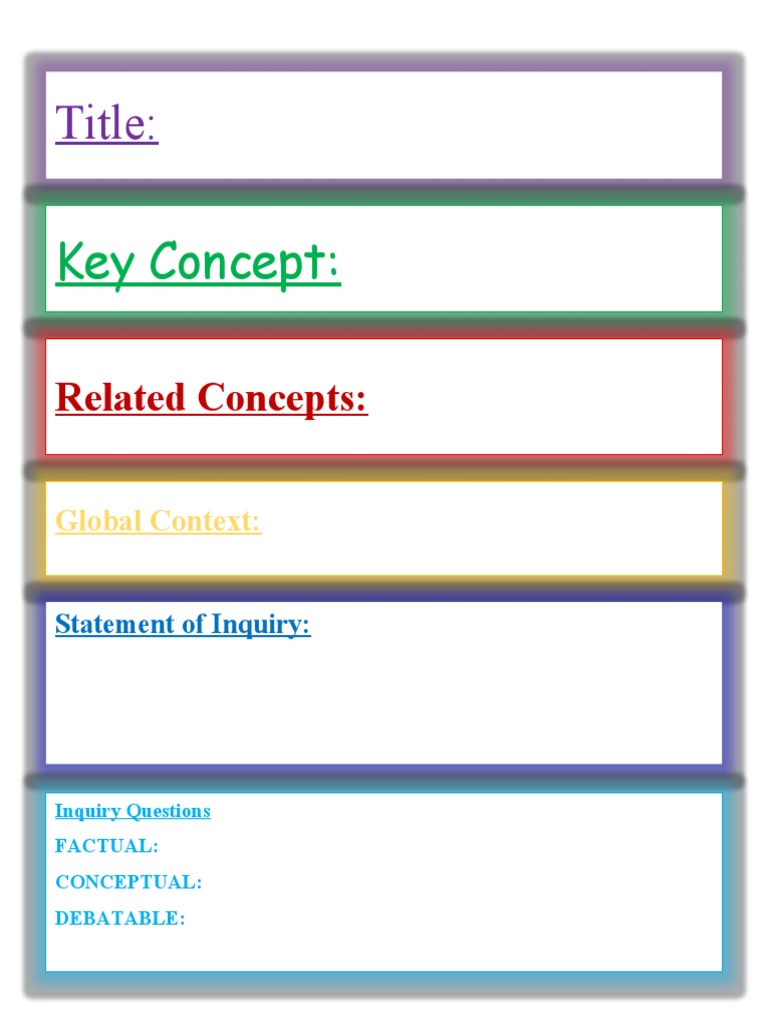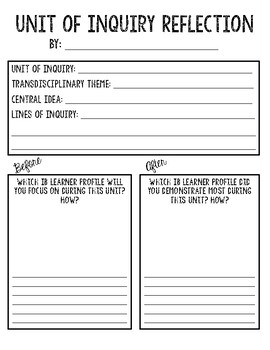Unlock IB PYP Success: Your Secret Weapon Unit Planner Template (Download Now!)
Meta Title: IB PYP Unit Planner: Your Ultimate Guide & Template
Meta Description: Master the IB PYP with our comprehensive guide and FREE unit planner template! Learn how to create engaging, inquiry-based units for student success. Download today!
Are you an educator embarking on the exciting journey of the International Baccalaureate Primary Years Programme (IB PYP)? Do you find the process of unit planning a little daunting? You’re not alone! Crafting effective and engaging units of inquiry is crucial for student success in the PYP. This article serves as your comprehensive guide to mastering unit planning, providing you with practical tips, insightful strategies, and a FREE unit planner template to get you started. Let’s dive in and unlock the secrets to exceptional IB PYP teaching!
Why Unit Planning Matters in the IB PYP
The IB PYP framework is built upon the principles of inquiry-based learning, transdisciplinary themes, and student agency. Unit planning is the cornerstone that brings these principles to life. It’s not merely a bureaucratic requirement; it’s a powerful tool that empowers teachers to:
- Create Meaningful Learning Experiences: Unit planning helps you design lessons that connect to students’ prior knowledge, interests, and real-world contexts.
- Ensure Curriculum Coverage: A well-structured unit plan ensures you address all the essential elements of the IB PYP curriculum, including the central idea, lines of inquiry, and learner profile attributes.
- Foster Student Agency: Unit planning allows you to incorporate student voice and choice, empowering them to take ownership of their learning.
- Promote Consistency and Collaboration: A clear unit plan provides a shared understanding of the learning goals and expectations for all stakeholders, including teachers, students, and parents.
- Assess Effectively: Unit plans guide the development of formative and summative assessments that accurately measure student understanding and progress.
Key Components of an Effective IB PYP Unit Plan
A successful IB PYP unit plan is more than just a list of activities. It’s a carefully crafted roadmap that guides the learning journey. Here are the essential components:
- Central Idea: This is the overarching concept the unit explores. It should be broad, conceptual, and transferable. (Example: “How we express ourselves influences our perspective of the world.”)
- Lines of Inquiry: These are specific questions or areas of exploration that help students delve deeper into the central idea. They should be related to the central idea and encourage inquiry. (Example: “How stories are created,” “How stories reflect different cultures,” “How stories influence our feelings.”)
- Transdisciplinary Theme: This is one of the six transdisciplinary themes that connect the unit to the wider world. (Example: “How We Express Ourselves”)
- Key Concepts: These are the big ideas that students will develop an understanding of throughout the unit. (Example: Form, Perspective, Connection)
- Related Concepts: These are more specific concepts that help students understand the key concepts. (Example: Genre, point of view, audience)
- Approaches to Learning (ATL) Skills: Identify which specific ATL skills (e.g., thinking skills, social skills, research skills) will be explicitly taught and developed throughout the unit.
- Learner Profile Attributes: Specify which IB learner profile attributes (e.g., inquirer, knowledgeable, thinker) will be fostered and assessed.
- Inquiry-Based Activities: Plan a variety of engaging activities that encourage student exploration, questioning, and discovery. These should include opportunities for collaboration, reflection, and assessment.
- Assessment Strategies: Outline how you will assess student understanding throughout the unit. This should include a balance of formative and summative assessments. Consider using a variety of assessment methods (e.g., observations, anecdotal records, student self-assessments, presentations, projects, tests).
- Differentiation: Plan how you will differentiate instruction to meet the diverse needs of all learners. This might include providing different levels of support, challenging students with extension activities, or offering alternative ways for students to demonstrate their understanding.
Using a Unit Planner Template: Your Step-by-Step Guide
A well-designed unit planner template can streamline the planning process and ensure you cover all the essential elements. Our free template (link to download here – this is a placeholder, replace with a working link) provides a structured framework to help you create effective and engaging units. Here’s how to use it:
- Start with the Big Picture: Begin by identifying the transdisciplinary theme and the central idea. Consider the grade level and the students’ prior knowledge.
- Develop the Lines of Inquiry: Brainstorm several lines of inquiry that will guide student exploration of the central idea. Ensure they are open-ended and encourage investigation.
- Identify Key and Related Concepts: Choose the key and related concepts that will support student understanding of the central idea.
- Plan Activities: Brainstorm engaging activities that will allow students to explore the lines of inquiry. Consider a variety of activities, including:
- Provocations: Activities designed to pique student interest and activate prior knowledge.
- Research: Opportunities for students to gather information and investigate their questions.
- Collaborative Projects: Projects that encourage teamwork and communication.
- Presentations: Opportunities for students to share their learning with others.
- Field Trips: (If applicable) External links can be added here.
- Integrate ATL Skills and Learner Profile Attributes: Explicitly plan how you will teach and assess ATL skills and foster the IB learner profile attributes throughout the unit.
- Design Assessments: Plan both formative and summative assessments to monitor student progress and understanding.
- Plan for Differentiation: Consider the diverse needs of your students and plan for differentiation to ensure that all learners can access the curriculum and demonstrate their understanding.
Practical Tips for IB PYP Unit Planning
- Collaborate: Work with your colleagues to brainstorm ideas, share resources, and provide feedback on unit plans.
- Involve Students: Seek student input throughout the planning process. Ask them what they want to learn and what activities they would find engaging.
- Be Flexible: Be prepared to adjust your unit plan based on student interests, needs, and progress.
- Reflect: After teaching the unit, reflect on what worked well and what could be improved. Use this reflection to inform your future unit planning.
- Use Technology: Utilize online resources, educational apps, and digital tools to enhance student engagement and support learning. (Link to a list of helpful educational apps here).
- Keep it Simple: Don’t overcomplicate the planning process. Focus on creating engaging learning experiences that align with the IB PYP principles.
Conclusion: Embrace the Power of Planning
Effective unit planning is the cornerstone of successful IB PYP teaching. By understanding the key components of a unit plan and utilizing a well-designed template, you can create engaging, inquiry-based learning experiences that foster student agency and promote deep understanding. Download our FREE unit planner template (link to download here – this is a placeholder, replace with a working link) today and start unlocking the potential of your IB PYP classroom! Remember to continuously reflect on your practice and adapt your plans to meet the evolving needs of your students. This will ensure a dynamic and rewarding learning environment for everyone. Resources like the IBO website (https://www.ibo.org/) can provide further support.




